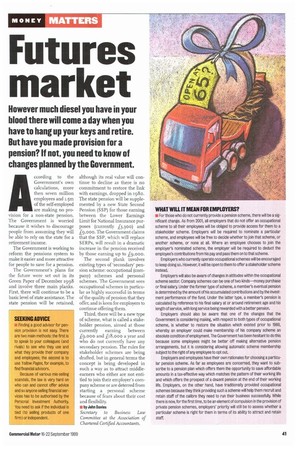WHAT WILL IT MEAN FOR EMPLOYERS?
Page 45

If you've noticed an error in this article please click here to report it so we can fix it.
• For those who do not currently provide a pension scheme, there will be a significant change. As from 2001, all employers that do not offer an occupational scheme to all their employees will be obliged to provide access for them to a stakeholder scheme. Employers will be required to nominate a particular scheme, and employees will be free to decide whether to join that scheme, or another scheme, or none at all. Where an employee chooses to join the employer's nominated scheme, the employer will be required to deduct the employee's contributions from his pay and pass them on to that scheme.
Employers who currently operate occupational schemes will be encouraged to keep doing so. However, it will be open to them to offer a stakeholder scheme instead.
Employers will also be aware of changes in attitudes within the occupational scheme sector. Company schemes can be one of two kinds—money purchase or final salary. Under the former type of scheme, a member's eventual pension is determined by the amount of his accumulated contributions and by the investment performance of the fund. Under the latter type, a member's pension is calculated by reference to his final salary at or around retirement age and his length of service, with long service being rewarded with a better pension.
Employers should also be aware that one of the changes that the Government is considering making, with respect to both types of occupational scheme, is whether to restore the situation which existed prior to 1988, whereby an employer could make membership of his company scheme an absolute condition of employment. The Government has been hesitant to do this because some employees might be better off making alternative pension arrangements, but it is considering allowing automatic scheme membership subject to the right of any employee to opt out.
Employers and employees have their own rationales for choosing a particuar pension scheme. As far as employees are concerned, they want to subscribe to a pension plan which offers them the opportunity to save affordable amounts in a tax-effective way which matches the pattern of their working life and which offers the prospect of a decent pension at the end of their working life. Employers, on the other hand, have traditionally provided occupational schemes because they think providing such a scheme will help them recruit and retain staff of the calibre they need to run their business successfully. While there is now, for the first time, to be an element of compulsion in the provision of private pension schemes, employers' priority wit still be to assess whether a particular scheme is right for them in terms of its ability to attract and retain staff.










































































































